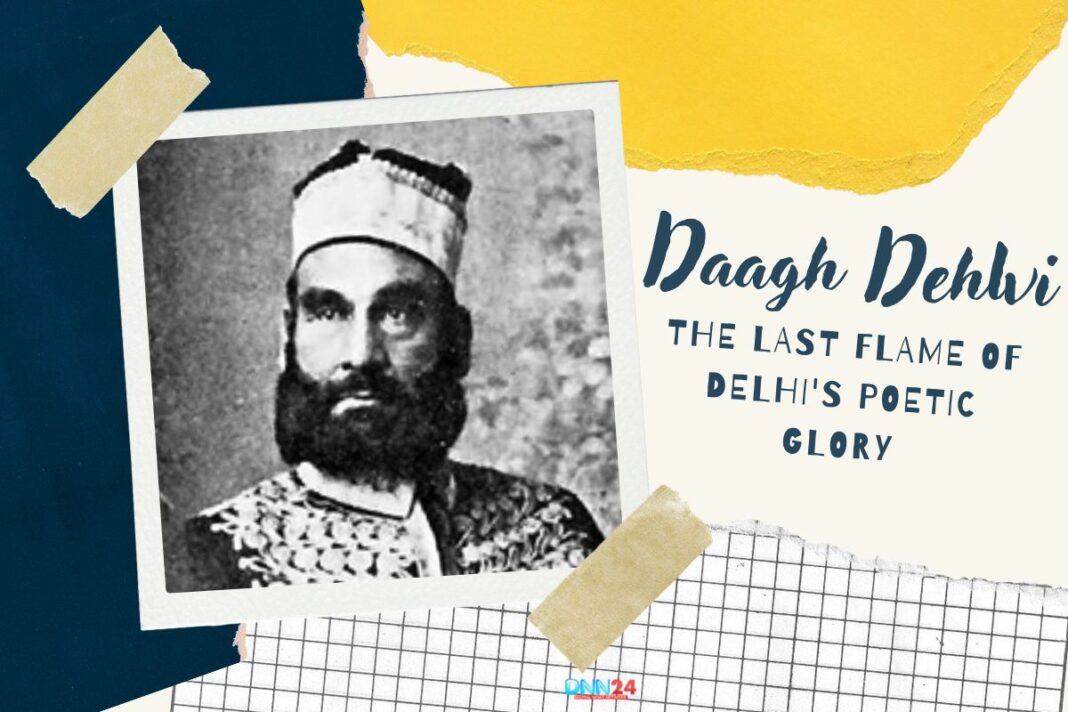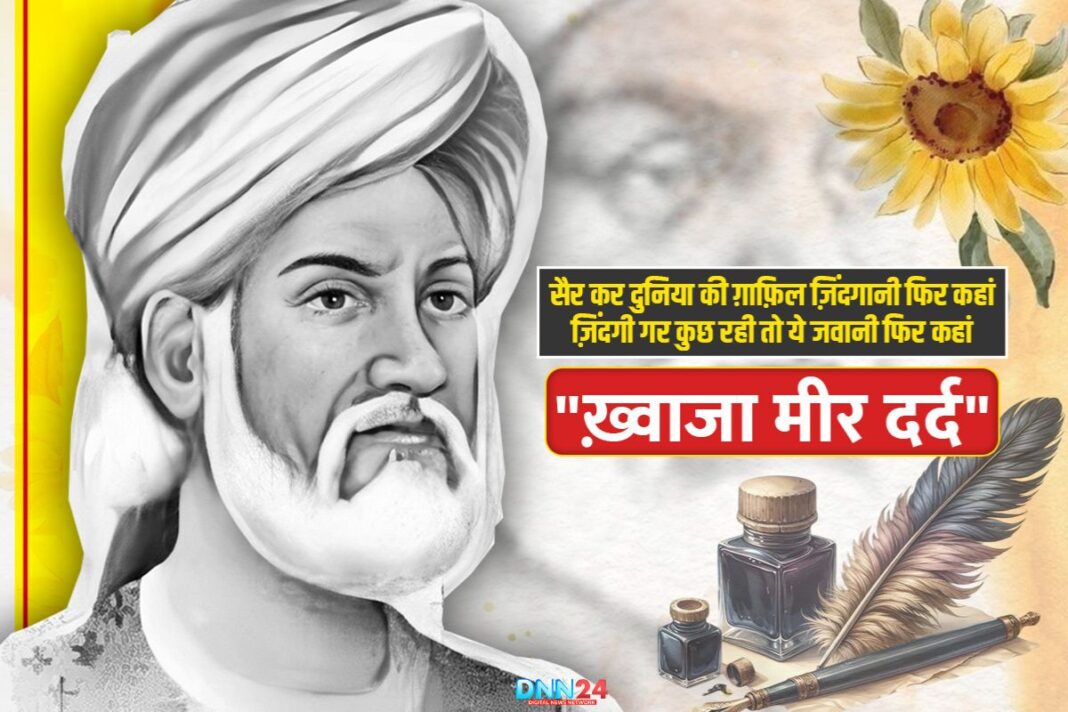Daagh Dehlvi, born Nawab Mirza Khan on 25th May 1831 in the bustling lanes of Delhi, came into a world filled with both privilege and pain. Nawab Shamsuddin Ahmed Khan, Daagh’s father, was a ruler, but he died only four years later when a conspiracy caused his execution. At first, Little Daagh’s life went upside down, but his mother, Wazir Khanum, soon wed the Mughal crown prince Mirza Muhammad Fakhroo. After this, Daagh was carried into the Red Fort, home of the best educational opportunities and where he discovered poetry and art.
Tumhara dil mere dil ke barabar ho nahin sakta,
Daagh Dehlvi
Woh sheesha ho nahin sakta, yeh patthar ho nahin sakta
At the Red Fort, Daagh spent most of his time focusing on calligraphy, riding and especially the written word. Moshir went to Mohammad Ibrahim Zauq for help and to Ghalib when he needed suggestions that molded his writing. Everything the princes said was caught in the walls, with every line and emotion making Daagh’s heartful. Even so, just underneath his public life, there was a sense of loss—an absence that would later lend emotion and nostalgia to his writing.
The Budding Poet: Early Inspirations and First Shayari
Daagh’s poetic journey began early. At only ten years old, he already made both the rich and the poor admire him by reciting his heartfelt, straightforward verses. He was a member of the Dabistan-e-Dehli group and tried to ensure his poetry did not use much Persian so it was understandable to everyone. Azad selected the name Daagh for himself, which means “stain” or “grief,” because so many wounds have marked his heart.
Hazaron kaam mohabbat mein hain maze ke ‘Daagh’,
Daagh Dehlvi
Jo log kuchh nahin karte kamaal karte hain.
He was not only talking about the sorrow in life but also the joy of getting loved, the beauty of people, and withdrawal play fighting by lovers. Daagh’s early poems were like fresh morning dew; they were simple pure, and full of hope. With time, he became an integral part of mushairas, and people flocked to listen to his romantic and sensuous ghazals.
A Royal Upbringing: Learning from Legends
As a kid, Daagh spent his life in the Red Fort, where his peers were prolific writers of that era. His stepfather, Mirza Muhammad Fakhroo, was the descendant of Bahadur Shah Zafar, the last Mughal emperor. This link brought Daagh close to the Ghalib, the master poet, whose mentorship influenced the weaving of Daagh’s style. He taught him how to infuse emotions into words, making them beautiful yet simple.
Wafa karenge, nibahenge, baat manenge,
Daagh Dehlvi
Tumhein bhi yaad hai kuchh, ye kalaam kis ka tha
Daagh’s poetry has never been aristocratic. For him, poetry was a medium to connect with everyone – rich or poor, elder or youthful, it did not matter. He seamlessly blended the traditional form of ghazal and nazm, thus becoming a link between the old and new. Even today, he is widely popular, with many using his couplets in daily banter and conversations.
Turmoil and Transition: From Delhi to Rampur
The death of his stepfather in 1856 changed everything. Daagh and his mother abruptly left the luxurious Red Fort and took shelter with the Nawab in Rampur. For nearly 24 years, Daagh lived in Rampur, working for the government. But the poet’s heart was restless. Because of the repeating routines in official life, his creativity thrived, but at the same time, it led to challenges.
Milate ho usi ko khaak mein jo dil se milta hai,
Daagh Dehlvi
Meri jaan chahne waala badi mushkil se milta hai.
At this time, Daagh created some of his most affecting and romantic poems. Missing Delhi, remembering his royal past and wishing for love became themes in Glory Between the Stanzas. He wrote poems about life, love and hope, not about sadness.
Unheard Kissey: The Untold Stories of Daagh’s Life
What you won’t see in Daagh’s Shayari are many stories of everyday pain, playfulness and the strength to get through it all. Among these kisso is one describing how he playfully challenged the famous Lucknow poet Amir Minai. On many occasions, the two poets would compete at mushairas by saying clever couplets and ribbing each other with their words. Their fun competitions in Urdu poetry gained fame and changed the scene of Urdu poetry.
Aap ka e’tibaar kaun kare,
Daagh Dehlvi
Roz ka intezaar kaun kare.
Zikr-e-mehr-o-wafa to hum karte,
Par tumhein sharmsaar kaun kare.
Ho jo us chashm-e-mast se be-khud,
Phir use hoshiyar kaun kare.
Tum to ho jaan ik zamaane ki,
Jaan tum par nisaar kaun kare.
Aafat-e-rozgaar jab tum ho,
Shikwa-e-rozgaar kaun kare
Another story is about Daagh’s love for simplicity. On one occasion, when asked why he skipped Persian words in his poetry, he responded, “Poetry speaks to our hearts, not to show our skills.” Because of his beliefs, everyone—from street poets to rulers in the Court—enjoyed his poetry.
The Hyderabad Chapter: Glory, Luxury, and Legacy
In 1891, Daagh’s life took a grand shift after he was invited to the Nizam of Hyderabad’s Court due to his poetry. There, he was offered handsome remuneration and was filled with praises such as “Bulbul-e-Hindustan” and “Nazim Yar Jung.” Daagh’s life took a complete turn after being invited to the Nizam’s Court, which transformed into a hub for poetic talent and became Daagh’s new residence. Surrounded by admirers and disciples, Daagh was able to compose some of his finest tragedies.
Nahin khel ai ‘Daagh’, yaaron se keh do,
Daagh Dehlvi
Ki aati hai Urdu zabaan aate aate
This period stood for the peak of Daagh’s prowess and creativity. He employed a horde of young poets, mentoring them throughout, which further helped him polish his own work. His evening get-togethers became the language of laughter, romance and gentle serpent teasing—a complete epiphany of life and artistry at its prime.
Daagh’s Romantic Shayari: The Heart’s Eternal Song
Poetry was equivalent to romance in Daagh Dehlvi’s eyes. It motivated his work for ghazals and nazms, which consisted of love and longing intertwined in playful flirtation. With Daagh’s work, you did not only get to relish the joys of unison but also the tender anguish of parting. His verses turned love into a heartwarming curse.
Achchhi surat pe ghazab TuT ke aana dil ka
Daagh Dehlvi
yaad aata hai hamein hae zamana dil ka
tum bhi munh chum lo be-saKHta pyar aa jae
main sunaun jo kabhi dil se fasana dil ka
nigah-e-yar ne ki KHana-KHarabi aisi
na Thikana hai jigar ka na Thikana dil ka
puri mehndi bhi lagani nahin aati ab tak
kyunkar aaya tujhe ghairon se lagana dil ka
ghuncha-e-gul ko wo muTThi mein liye aate the
main ne puchha to kiya mujh se bahana dil ka
in hasinon ka laDakpan hi rahe ya allah
hosh aata hai to aata hai satana dil ka
de KHuda aur jagah sina o pahlu ke siwa
ki bure waqt mein ho jae Thikana dil ka
All along, deaths Shayari was rooted in gentle emotions. There was never a hint of disgust nor exceeded moderation, only the utmost respect. As for Daagh, love was the finest emotion, which is why his work was so immaculate. His couplets are still recited by lovers, performed by ghazal singers, and cherished by anyone who has ever loved or lost.
Daagh’s Nazm: The Melody of Simple Words
Daagh Dehlvi’s nazms prove his mastery of employing simple yet impactful words. In contrast to the elaborate metaphors and grandiloquent language by fellow poets of his time, Daagh’s nazms were heartfelt. His use of everyday vocabulary was the hallmark of his deep and soulful expression, something that resonated with the common person.
Urdu hai jis ka naam humein jaante hain ‘Daagh’,
Daagh Dehlvi
Hindostan mein dhoom hamari zabaan ki hai
Love, longing, hope, and life’s bittersweet moments were a few of the many themes he touched in his name. While he depicted the grace of a beloved or the plight of their separation, Daagh’s nazms were always accompanied by melody, a gentle caress that lingers far beyond the last line of the poem.
Daagh’s Ghazals: The Voice of Every Lover
Daagh’s ghazals are the talk of the town. He single-handedly composed more than sixteen thousand couplets, which were later compiled into four major volumes: Gulzar-e-Daagh, Aftab-e-Daagh, Mahtab-e-Daagh, and Yaadgar-e-Daagh. His works are known for exuberant ghazals depicting joy, love and celebration. Unlike many poets who focused on sorrow and despair, Daagh’s ghazals were lively and full of hope.
Lutf wo ishq mein pae hain ki ji jaanta hai
Daagh Dehlvi
ranj bhi aise uThae hain ki ji jaanta hai
jo zamane ke sitam hain wo zamana jaane
tu ne dil itne satae hain ki ji jaanta hai
tum nahin jaante ab tak ye tumhaare andaz
wo mere dil mein samae hain ki ji jaanta hai
His ghazals continue to be performed by eminent artists like Ghulam Ali, Mehdi Hassan, and Abida Parveen, thus enabling his legacy to thrive for ages. Daagh’s couplets depict that love, in his eyes, is the greatest escapade one could go on.
The Poet’s Philosophy: Humanity, Simplicity, and Joy
Simple, joyful, and full of humanity—these words encapsulate Daagh Dehlvi’s thoughts on poetry. He sidestepped clunky, intricate words and fixated on the language of the heart. His poetry never attempted to display knowledge; instead, it aimed to heal. He catered to all the youths in love, the heartbroken friends, and the dreamers full of hope.
Sab log jidhar vo hain udhar dekh rahe hain,
Daagh Dehlvi
Hum dekhne walon ki nazar dekh rahe hain
His poems were often entwined with whimsical light-heartedness, playful banter, and a profound comprehension of emotional depth. He appreciated love, friendship, and the simple joys of life from different spectacles.
Legacy: The Eternal Flame of Daagh’s Poetry
The world met the loss of Dehlvi on 17th March 1905 in Hyderabad, after which he left behind an endless pool of poetry. His writings marvel and inspire people even now. Daagh remains a profound figure for poetry lovers, in addition to aspiring singers and young poets who are mentored by his words.
Dil de to is mizaaj ka Parwardigaar de,
Daagh Dehlvi
Jo ranj ki ghadi bhi khushi se guzaar de
Not merely as a poet is he remembered but as a friend of the heart—a companion for every dreamer and lover and every soul that seeks the meaning of life in its journey.
Conclusion: Daagh Dehlvi—The Poet Who Made Love Simple
Daagh Dehlvi traveled through royalty and hardship, love and loss, simplicity and grandeur. He left behind poetry that is a source of comfort and joy, a reminder that true love is simple, pure, and eternal. His nazms and ghazals are gentle songs that touch the soul. They make us smile, cry, and fall in love all over again.
Hamein hai shauq ki be-parda tumko dekhenge,
Daagh Dehlvi
Tumhe hai sharm to aankhon pe haath dhar lena
Daagh Dehlvi’s light will never go out. His language will unite people all over the world in the beautiful pursuit of poetry. His work will only grow in remembrance and reverence.
Also Read: Amir Khusrau: Poet, Mystic, Musician, and Cultural Icon
You can connect with DNN24 on Facebook, Twitter, and Instagram and subscribe to our YouTube channel.



